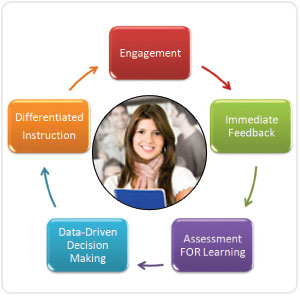I’ve been asked to return as the keynote speaker at the Project Foundry® Un-Conference – a gathering of 75 PBL educators from California to New Jersey. This year it will be held July 29th – Friday July 30th 2010 in Milwaukee, WI. If you’re looking to network with innovative educators who are committed to project-based learning, I urge you check this conference out. Plus they are one fun group!
Last year I keynoted at Project Foundry’s first conference. The experience inspired the blog post (August 4, 2009) that I am reposting below:
 Innovative Teaching is to Sustainable Farming as Test Prep is to _____?
Innovative Teaching is to Sustainable Farming as Test Prep is to _____?
Recently I spoke at a project-based learning conference in Wisconsin. I had been reading Michael Pollan’s “The Omnivore’s Dilemma,” so I had farming on my mind as I drove from the Milwaukee airport to Janesville WI past vast cornfields punctuated by enormous grain silos.
Pollan observes that high-yield corn is a product of genetically identical plants that can be densely planted without fear of any stalks monopolizing resources. As corn dominated the midwestern landscape, the region became an agricultural monoculture of expansive corporate cornfields – pushing out other crops and more diverse family farms. Cheap corn created the “Concentrated Animal Feeding Operation,” where never-ending truckloads of feed are used to fatten cattle in the least time possible. “Big” corn and cattle production are artificially supported by vast, but unsustainable, industrial inputs of fossil fuels, petro-chemicals, and an elaborate transportation system.
And somewhere on the drive to Janesville, I got thinking that Pollan’s indictment of corporate agriculture might be extended to some aspects of education. The testing regime is turning our kids into a high-yield, uniform commodity. Rows and rows of competent, standardized students, that can be delivered according to employers’ specifications for a “skilled workforce.” Children “force fed” in test prep programs in efforts to quickly “fatten” the scores to meet AYP. Like the cornfields and feedlots that are disconnected from local ecosystems, the movement toward national educational standards erodes at local control and innovation.
Fortunately when I got to the conference I saw another side of contemporary education – innovative teachers. It was like walking into a sustainable farmers’ market.
The conference was held at the TAGOS Leadership Academy and hosted by Project-Based Learning Systems, the developer of Project Foundry, a web-based management tool for innovative learning environments. Teachers had come from across the country – Chula Vista CA to Waterville ME. Like sustainable farms, their schools were deeply rooted in their communities, each closely tied to its unique local social ecology. Their programs fostered interdisciplinary learning, like the symbiotic polyculture of a farm based on a rotational interplay of crops and animals.
The PBL approach is based on the notion that rather than simply apply bodies of knowledge to problems, the exploration of problems can generate new bodies of knowledge. Teachers didn’t attend the conference to simply “sit and get,” they were there to share. After my introductory talk and a planning session using my audience response system, the teachers self-organized into a series of peer-teaching sessions that took them through most the rest of the conference.
The next day I headed home feeling upbeat. I had met many fine teachers and instructional leaders who reminded me of why I went into education. Most of all, I thought about the scores of teachers across the country, working in innovative schools (or perhaps subversively innovating in traditional schools), committed to raising a “crop” that can sustain itself through a life time of learning.


